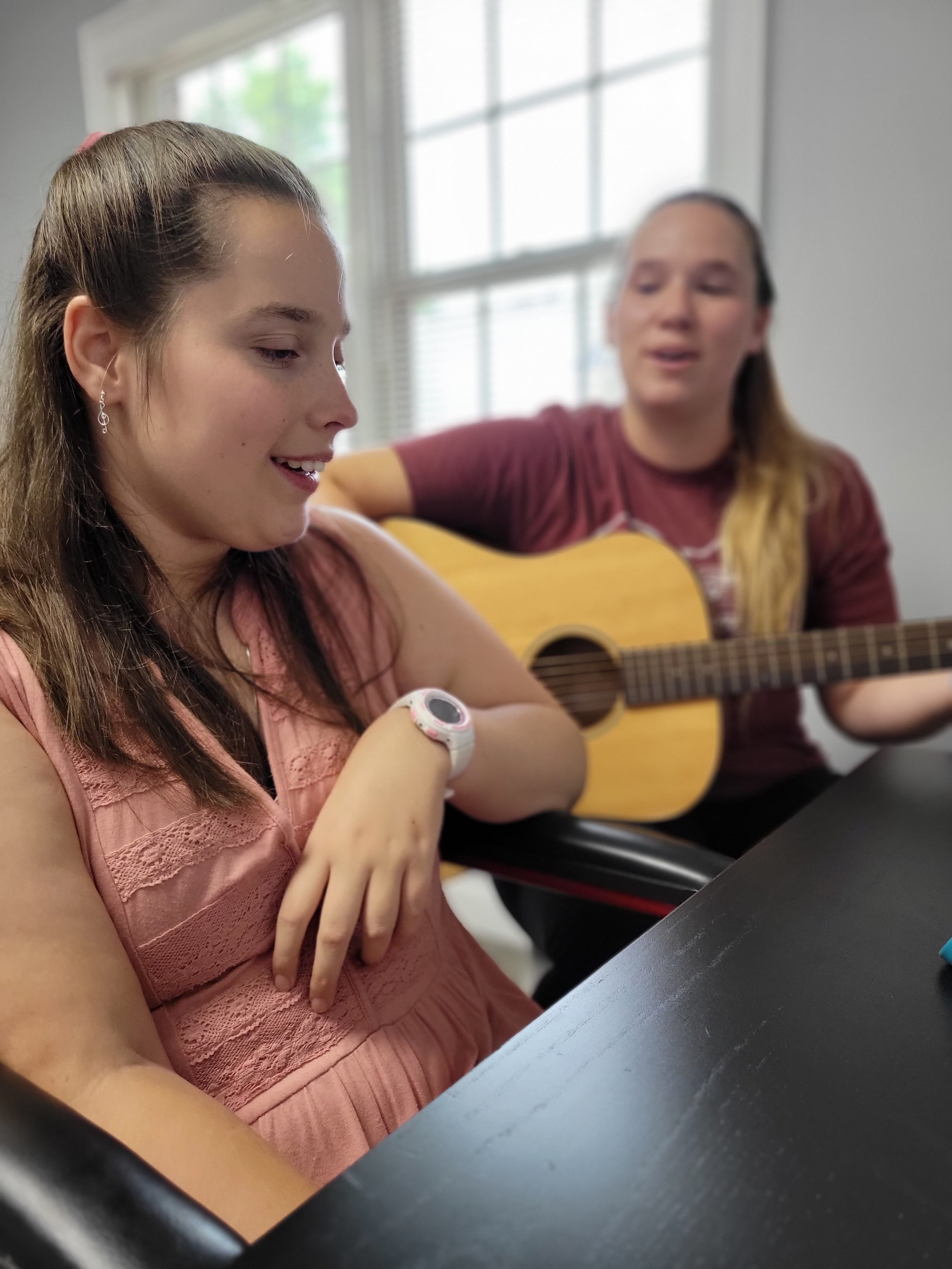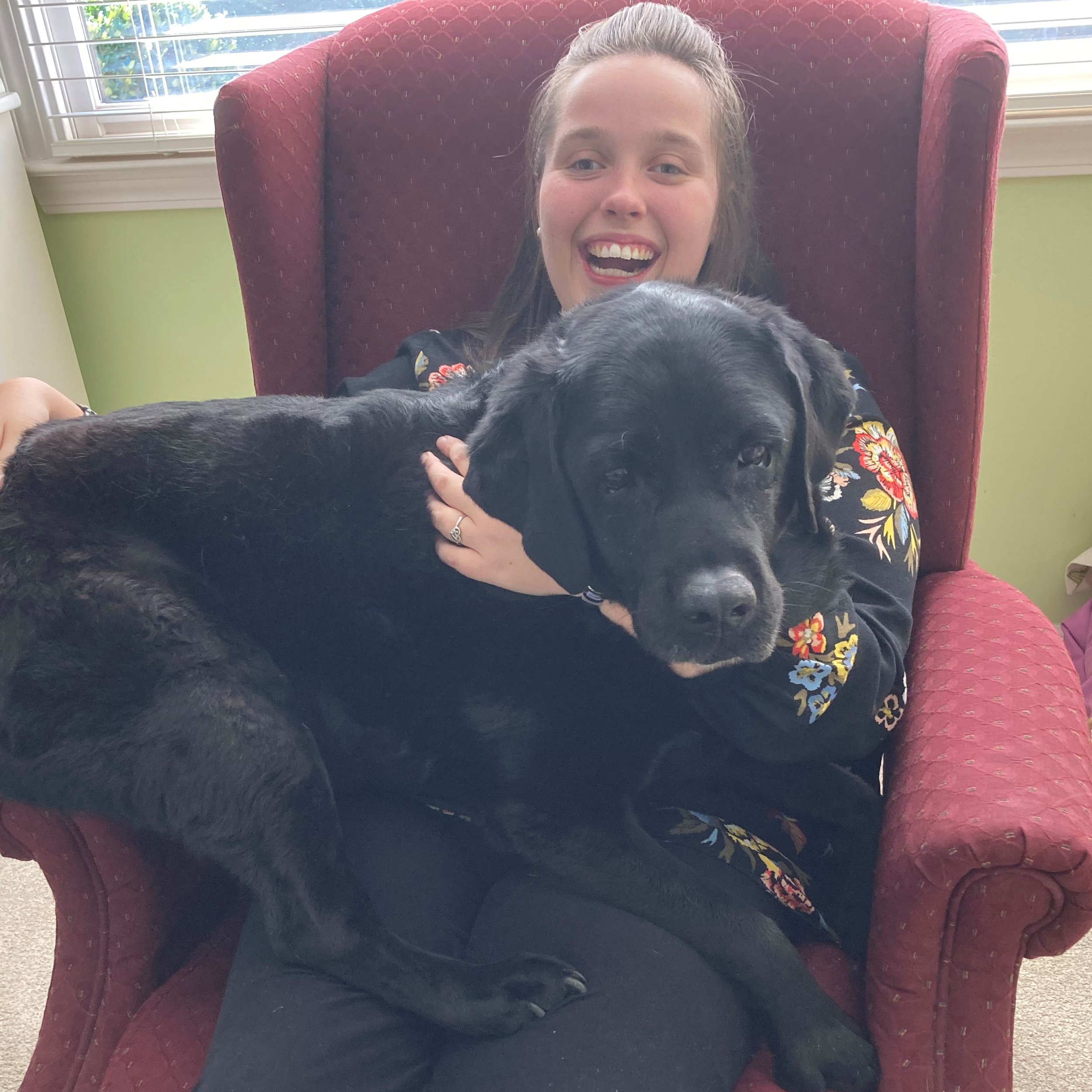More Than ‘Man’s Best Friend’
For some of our clients at Perfect Harmony Health, having access to service dogs can help make a difference in their everyday lives. I had the pleasure of interviewing McKenzie Wortman, diagnosed with Cerebral Palsy who receives Neurologic Music Therapy (NMT)® services at Perfect Harmony Health, and Tricia Simonds, a parent within our community, to help us understand the benefits of service dogs, the process of receiving service dogs, what populations service dogs can serve and how they serve them, the process of how they are trained, and their personal experiences with their own service dogs.
McKenzie brings her current service dog, Marnie, to her music therapy sessions weekly. Marnie is about twelve years old and has been McKenzie’s companion dog for six years. Throughout McKenzie’s life, she has had the opportunity to own two service dogs, Yoshe and Marnie. Some of the benefits McKenzie has expressed she receives from her service dogs include being a constant source of comfort and companionship, as well as retrieving objects McKenzie may have dropped.
As someone who has received a service dog, McKenzie knows all about the process of obtaining one. McKenzie has received both of her service dogs from Canine Companions for Independence (CCI), located in Orlando, FL. CCI will have you go on their website and fill out an application where they ask you about yourself, what your needs are, and what kinds of tasks a service dog would need to help you with. They inquire about other pets you may have and if you are going to be able to care for a dog and reinforce their training. Next, they will schedule a phone interview and if the phone call goes well, they ask you to go to the campus for a face-to-face interview. Pending the success of the interview, you are placed in the training program. You will be placed in a room with all of the dogs, and they will pick out which one matches best with you. After you get paired with a service dog, they take you on field trips or public outings to learn what the dog knows in public and what you’re expected to do. In the training, they will teach you all of the commands you need to know, and you are required to attend lectures on how to care for the service dog. The last step is a graduation ceremony where the puppy raiser has the opportunity to pass the leash of the dog to its new partner. You then receive a diploma with both names on it. Post-training, individuals with service dogs have to renew their dogs' public access and retake the training once a year.
Tricia Simonds is a Registered Dietician and is a parent to one of our clients at PHH. Completely unrelated to her profession, she picked up volunteering with Canine Assistants in January of 2018, when she realized her family needed something to help with stress. Tricia states, “I knew that I wanted to have a dog but I knew that in our life with special needs, it would be really difficult…people in church told me about Canine Assistants.” Canine Assistants is located in Milton, GA, and is always looking for volunteers. Tricia specifically volunteers with fostering younger dogs, and partners with another individual to spend time with these dogs and get them used to being shown affection and exposing them to real-world situations, such as taking them to music therapy appointments, grocery shopping, using vacuum cleaners, bathing them, teaching them to get on elevators or walk up the stairs, or getting them used to walking through the rain with an umbrella. All outings are dependent on what each individual dog needs.
In Tricia’s experience, she has volunteered with eight different service dogs since 2018. She is currently working with two, Corryn and Sam, and has been volunteering with them for about 14 months. Since Tricia is in the workforce herself, she brings the service dogs with her to work, as well as bringing them to her various errands throughout the day. For Tricia, she has seen benefits from volunteering with the service dogs with her son, Cole. For long car rides, “the dogs will lay on him and if he is feeling a little bit elevated, they definitely calm him”.
Service dogs can serve a variety of populations, such as individuals with mobility difficulties, individuals with diabetes, seizures, or hospital settings. Dogs serving mobility clients can assist with balance and guidance. Service dogs can sense changes in blood chemistry and alert their diabetic owner when their blood sugar drops too low or surges too high. Service dogs who are owned by individuals who have epilepsy are trained to find help or assist their partner during and/or after a seizure. Dogs assigned to individuals with epilepsy are naturally able to detect an oncoming seizure and are trained to warn their partner. In hospital settings, service dogs can be used to distract and support during procedures.
Overall, clients at Perfect Harmony Health can attest to the great benefits of receiving a service dog, and even what it is like to assist in volunteering with training programs. If you are interested in either of the organizations mentioned above, you can access them using these links:




